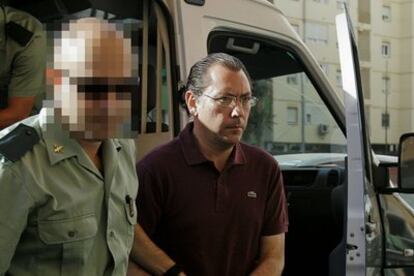The bounder with a sherry-label name
Jenaro Jiménez faked his own death, fled to Asunción and moved in with a Miss Paraguay contestant
His life could inspire a Hollywood movie. Jenaro Jiménez faked his death after he allegedly swindled thousand of euros from different banks and then fled to South America, where he married a beauty queen and started a new family.
Now, the Spaniard is on trial on charges that he stole 30,000 euros from Bankinter - the first of many cases filed against him. On Tuesday, Jiménez, looking thinner than he did when he was captured and arrested in Spain in 2009, declined to speak with reporters as he was being led into the courtroom.
It was April 2008 when Jiménez drove his BMW to the Playa de los Alemanes beach in Tarifa, Cádiz province, on the pretext of going scuba diving. He was awash in debt from bad business deals and had taken out various loans in his wife's name.
Jiménez "disappeared," making it appear that he had drowned. He eventually made it to Brazil and then later settled in Paraguay. During his first days in Asunción, he stayed at a hotel. On one of his outings, Jiménez met Rossana Villalba, a former Miss Paraguay beauty contestant, who was working as a store clerk at a fashionable mall. The 28-year-old woman lived about 20 minutes outside of the Paraguayan capital but the two immediately became romantically involved.
He told her his name was Álvaro Domecq y Carbajal and that he had moved to Paraguay because he was tired of living in Madrid and wanted to invest in her country, Villalba would later tell a reporter.
Jiménez also reportedly told the former beauty queen that he was a bachelor with no family back home, when in fact he had abandoned his pregnant wife and a small child. Jiménez moved in with Villalba; they first lived at her parents' home and then moved into a commercial area where, together, they set up and ran a liquor store. They soon had a daughter.
Villalba's parents really liked Jiménez and treated the aristocratically named Spaniard like a son. They were surprised to learn that he was leading a double life.
Back home, the police grew suspicious after spending three days dredging for the body in the waters off the beach in Tarifa. His family believed that because he suffered from diabetes, he must have had a heart attack while diving.
When financial institutions began filing complaints against him for non-payment of his loans, the police in Cádiz contacted Interpol to put a red alert on Jiménez. He had taken out a series of loans to try to develop a real estate business.
In June 2009, Jiménez suddenly told his new family that he had to return to Spain to "take care of some business." By August, he was in custody. It was only then that his Paraguayan wife discovered his true identity.
In just one year, Jiménez had deceived two families: his wife in Spain had filed for a divorce and asked the court for a restraining order; in Paraguay, Villalba legally changed her young daughter's last name, removing the fake Domecq y Carbajal.
Besides fraud, Jiménez has been charged with illegal appropriation and submitting false documents to financial institutions. His lawyer, Alfonso Jiménez, has tried to make some sense of what his client has done.
"It was a delusion; he was burdened with debt. He's not right in the head. Just by changing his name to Álvaro Domecq [the name of a sherry producer] is proof of that," he explains. The lawyer insists that no one asked him to return to Spain - neither the police nor his family. It was Jenaro Jiménez who decided come back to Spain. "He is sorry for what he has done and wants to repair the damage."

Tu suscripción se está usando en otro dispositivo
¿Quieres añadir otro usuario a tu suscripción?
Si continúas leyendo en este dispositivo, no se podrá leer en el otro.
FlechaTu suscripción se está usando en otro dispositivo y solo puedes acceder a EL PAÍS desde un dispositivo a la vez.
Si quieres compartir tu cuenta, cambia tu suscripción a la modalidad Premium, así podrás añadir otro usuario. Cada uno accederá con su propia cuenta de email, lo que os permitirá personalizar vuestra experiencia en EL PAÍS.
¿Tienes una suscripción de empresa? Accede aquí para contratar más cuentas.
En el caso de no saber quién está usando tu cuenta, te recomendamos cambiar tu contraseña aquí.
Si decides continuar compartiendo tu cuenta, este mensaje se mostrará en tu dispositivo y en el de la otra persona que está usando tu cuenta de forma indefinida, afectando a tu experiencia de lectura. Puedes consultar aquí los términos y condiciones de la suscripción digital.








































